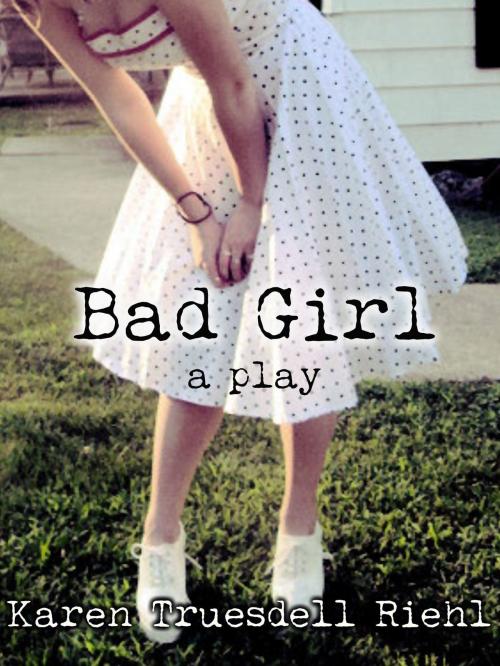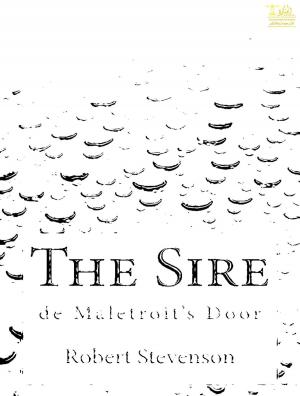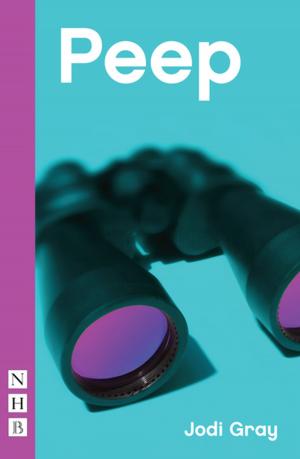| Author: | Karen Truesdell Riehl | ISBN: | 9781310286940 |
| Publisher: | Karen Truesdell Riehl | Publication: | May 10, 2014 |
| Imprint: | Smashwords Edition | Language: | English |
| Author: | Karen Truesdell Riehl |
| ISBN: | 9781310286940 |
| Publisher: | Karen Truesdell Riehl |
| Publication: | May 10, 2014 |
| Imprint: | Smashwords Edition |
| Language: | English |
"Though the play reads very well as a novel, it deserves to be on stage, especially in schools. Fine writing, but also a solid message."
Grady Harp
Homes for unwed mothers disappeared when contraceptives became readily available and abortion legal. But in the early 1950s a girl who became pregnant "out of wedlock," was often treated as an outcast, a "bad girl," who "got herself pregnant," and needed to be hidden away from polite society. The fictional Safe Haven Home for Unwed Mothers provides shelter from a judgmental society, but reveals its hypocrisy as well. The young women of this play come from all levels of society, rich and poor, educated and uneducated, sharing only the plight of their unwanted pregnancies. Marty is large and loud, hiding her vulnerability behind imitations of movie stars. Tinker is Marty's go-fer, a tiny girl from the hills with a huge heart, who never learned to read. Mary is the oldest. She made the mistake of falling in love with her minister. Rebecca's a southern belle who swears she's a good girl who was raped and claims to be shocked by the behavior of the other girls. She finds comfort in secretly reading dirty books. Kameela is frightened and silent, planning to do what she thinks will make her a good girl again. Sarah watches and learns. This is a story of frightened and angry young women, faced with the decision of whether to keep or give up their babies for adoption, but finding strength in a friendship built by mutual hardship and gallows humor.
Review by Lola, for GoodReads:
I'd heard of women in the fifties being "sent away" if they got pregnant out of wedlock, but I didn't really know much about it. What a difference from our culture today. It would have been impossible for these women to imagine a time when there would be a TV show called "Sixteen and Pregnant" that brought attention to young unwed mothers and made celebrities out of them. My favorite girls were Marty, Mary, and Sarah. I loved Marty's wit and spunk, and Mary was just so sweet. Her backstory was probably the saddest to me, and I liked the scene between the social worker and Mary's minister. I was like, "Oh, dude, you guilty of something, aren't you? I know you are." I just got so mad for Mary, but I also admired her. She seemed so level-headed about everything. My favorite part was probably Sarah's letter to Marty. I hated that the girls couldn't keep in contact with each other even if they wanted to. It would've been nice for them to have that outside support system. Good play! I'd like to see this performed one day.
"Though the play reads very well as a novel, it deserves to be on stage, especially in schools. Fine writing, but also a solid message."
Grady Harp
Homes for unwed mothers disappeared when contraceptives became readily available and abortion legal. But in the early 1950s a girl who became pregnant "out of wedlock," was often treated as an outcast, a "bad girl," who "got herself pregnant," and needed to be hidden away from polite society. The fictional Safe Haven Home for Unwed Mothers provides shelter from a judgmental society, but reveals its hypocrisy as well. The young women of this play come from all levels of society, rich and poor, educated and uneducated, sharing only the plight of their unwanted pregnancies. Marty is large and loud, hiding her vulnerability behind imitations of movie stars. Tinker is Marty's go-fer, a tiny girl from the hills with a huge heart, who never learned to read. Mary is the oldest. She made the mistake of falling in love with her minister. Rebecca's a southern belle who swears she's a good girl who was raped and claims to be shocked by the behavior of the other girls. She finds comfort in secretly reading dirty books. Kameela is frightened and silent, planning to do what she thinks will make her a good girl again. Sarah watches and learns. This is a story of frightened and angry young women, faced with the decision of whether to keep or give up their babies for adoption, but finding strength in a friendship built by mutual hardship and gallows humor.
Review by Lola, for GoodReads:
I'd heard of women in the fifties being "sent away" if they got pregnant out of wedlock, but I didn't really know much about it. What a difference from our culture today. It would have been impossible for these women to imagine a time when there would be a TV show called "Sixteen and Pregnant" that brought attention to young unwed mothers and made celebrities out of them. My favorite girls were Marty, Mary, and Sarah. I loved Marty's wit and spunk, and Mary was just so sweet. Her backstory was probably the saddest to me, and I liked the scene between the social worker and Mary's minister. I was like, "Oh, dude, you guilty of something, aren't you? I know you are." I just got so mad for Mary, but I also admired her. She seemed so level-headed about everything. My favorite part was probably Sarah's letter to Marty. I hated that the girls couldn't keep in contact with each other even if they wanted to. It would've been nice for them to have that outside support system. Good play! I'd like to see this performed one day.















